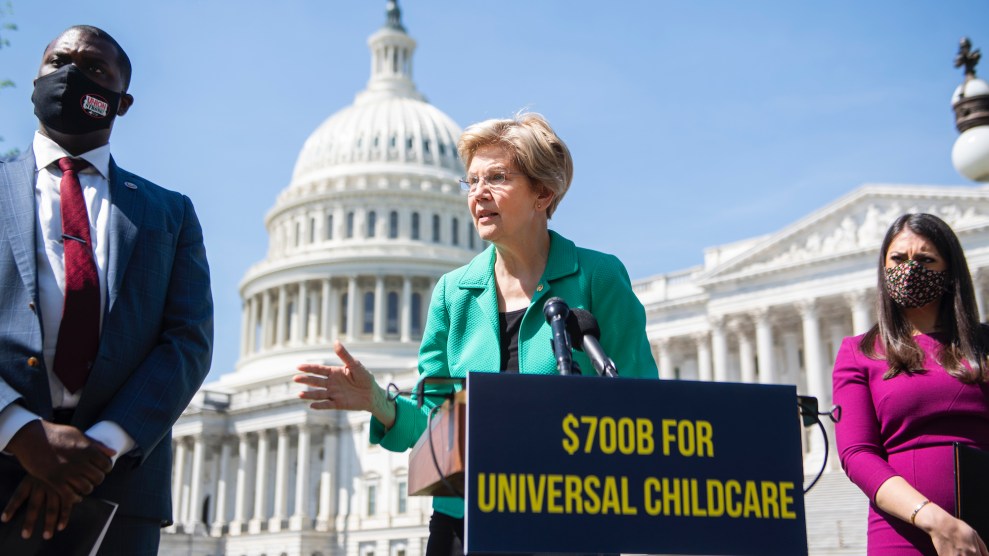
Children play at the new Branford Childcare Center in Los Angeles, California on Monday, June 13, 2022.Hans Gutknecht/MediaNews Group/Los Angeles Daily News via Getty Images
The average cost of day care in the US exceeds $10,000 annually for one child, according to national nonprofit Childcare Aware. More than half of US parents say the cost exceeds 20 percent of their household income, and nearly three-quarters of families say child care expenses eat up more than 10 percent of their earnings, the First Five Years Fund estimates. That is the cost if parents can even find a center with open spots: 34 percent of families with young kids faced “serious problems getting childcare” when they needed to work, according to a 2021 NPR survey.
In order to have a functioning economy, a country needs workers. And workers who have young kids need their children to have supervision while they are at work. Most other developed countries, such as France and Denmark, have solved the problem by subsidizing the hell out of day care so workers can afford it. But the United States has not—at least, not yet.
On Thursday, Sen. Elizabeth Warren (D-Mass.) and Rep. Mikie Sherrill (D-NJ) plan to introduce a bill that would create a mandatory federal investment to create a network of locally-run child care centers that ensure families pay no more than 7 percent of their income on childcare and that lower-income families making less than 75 percent of their state median income pay nothing.
Half of US families nationwide would pay no more than $10 a day for child care, according to a fact-sheet about the bill exclusively obtained by Mother Jones ahead of its release. The exact cost of the proposed program was not immediately clear.
“It is time for this country to make the same kind of investment in child care that it makes in other infrastructure like roads and bridges and power, things that help people get to work and to keep this country running,” Warren says in an interview.
The funding would help day care centers, too. Despite the enormous price tag of day care, most centers are barely getting by. Their average profit margin is abysmal—less than 1 to 5 percent, according to some tallies.
Their largest cost is payroll: Strict state and national guidelines require child care centers to keep low child-to-adult ratios per room. This keeps kids safe, but it also drives up how much day care centers have to spend on staffing. Then they have to keep the kids occupied with books and toys, often feed them, and of course clean up after them—all things that require spending on supplies.
Federal programming would also make it easier to retain qualified employees. The median day care wage is just $13.22 per hour; workers could easily earn more at certain fast food chains. Even doggy day care workers have a higher median wage, according to the Bureau of Labor Statistics.
So far, Warren and Sherrill’s bill is backed by Bernie Sanders (I-Vt.), Senate Finance Committee Chair Ron Wyden (D-Ore.), Senators Edward J. Markey (D-Mass.), Cory Booker (D-N.J.), Alex Padilla (D-Calif.), Sheldon Whitehouse (D-R.I.), Tina Smith (D-Minn.), and Richard Blumenthal (D-Conn.), and more than two dozen Democratic members of the House. The proposal—like most in in the current Congress—faces an enormous uphill battle to enactment, given that Republicans control the House of Representatives and Democrats don’t have a large enough Senate majority to pass most types of legislation without the support of at least a few Republican Senators. But while the odds of passage in at least the next two years are low, it is still noteworthy in the sense that its authors represent very distinct factions of the Democratic party. An issue like universal childcare was a progressive pipe dream a few years ago; today, many Democrats donned crayon-pins to this week’s State of the Union Address—which name-checked childcare as a critical issue—and both moderate and progressive Democrats are working on legislation to get it done.
Some Republican lawmakers have expressed support for expanding affordable child care access in the past. Last year, Sens. Richard Burr (R-NC) and Tim Scott (D-SC) introduced a bill that would expand a block grant program to make more families eligible for free or reduced childcare through their state governments. Like Warren and Sherrill’s bill, it would have ensured no eligible family paid more than 7 percent of their household income towards child care. But unlike the Democrats’ bill, its drafters didn’t express support for new government funding to pay for the program. In that sense, the GOP plan wouldn’t have expanded the affordable child care program or the number of kids it could serve—it would have merely expanded the waitlist for it.
Warren says expanding affordable child care programs can’t happen without sizable investment. But as Republicans threaten the nation with default of the debt ceiling, she says there is a way to create and fund this initiative that doesn’t further indebt the country or raise taxes on ordinary Americans. “We just need to ask billionaires and the giant corporations to pay their fair share,” says Warren. “If giant international corporations could no longer use tax havens and had to pay a 15 percent minimum corporate tax internationally, then we’d have much of what we need to provide child care for all of our little ones.”
Both Warren and Sherrill also say that not doing anything to make childcare more affordable will cost the nation billions in the long run. Sherrill points out that many parents are opting to stay home rather than work because they can’t find child care options that cost less than what they would bring home by working. That makes it difficult for companies to find employees, and it also hurts the lifetime wage potential of a parent who temporarily stays home when they try to get work later on. Passing this bill would add “an extra $48 billion into the nation’s GDP,” Sherrill says. “We are leaving money on the table if we don’t support working parents.”
But another reason they are introducing the bill, Warren tells Mother Jones, is to make Republican lawmakers take a public stance on the issue of government investment into child care, or rather, the lack thereof.
“My job right now is to drive up the political pain for every elected official who turns their back on the kind of families who need help so that they can finish their education and go to work,” she says.
In a narrowly divided and deeply divisive Congress, there’s not much else lawmakers can do.

















